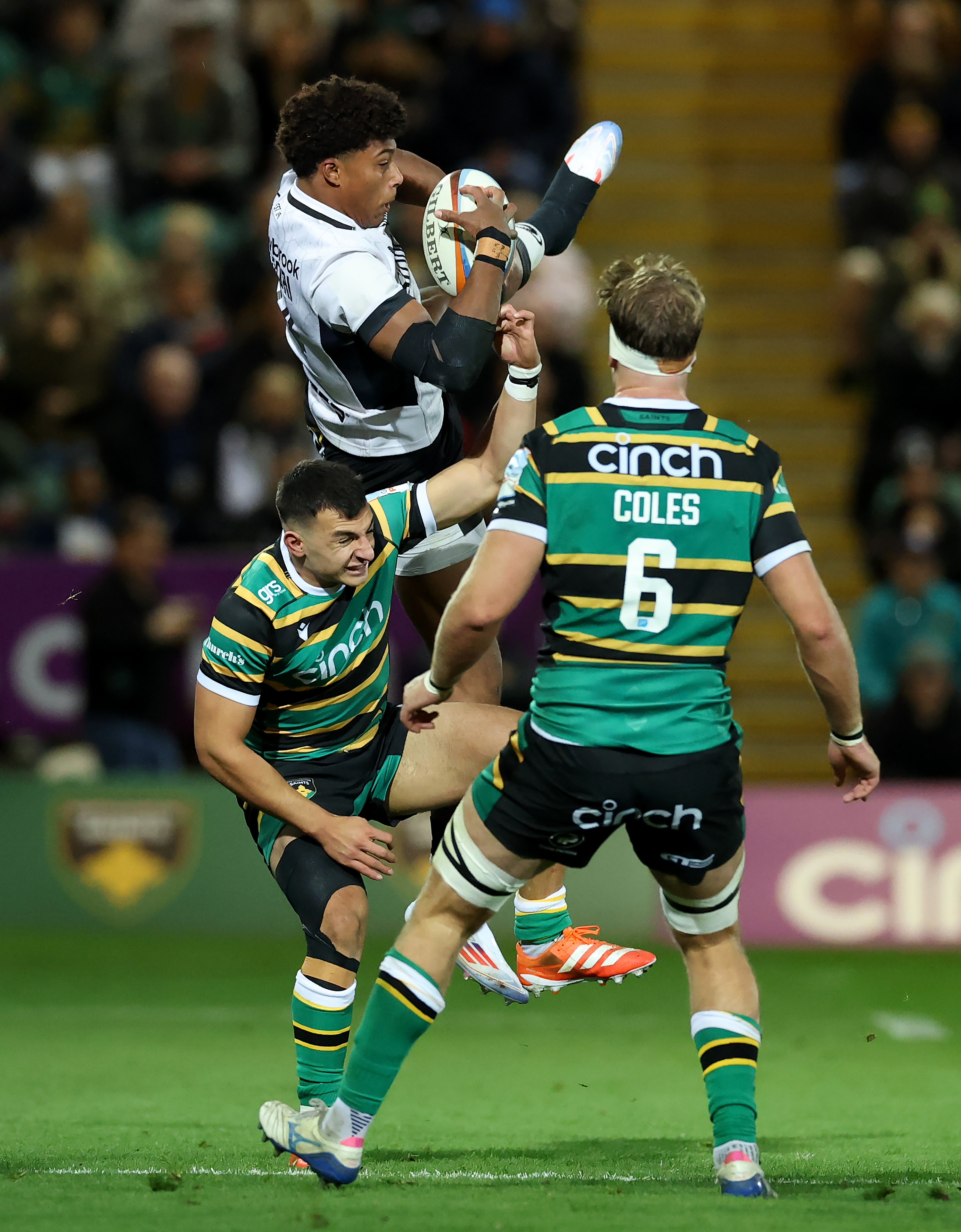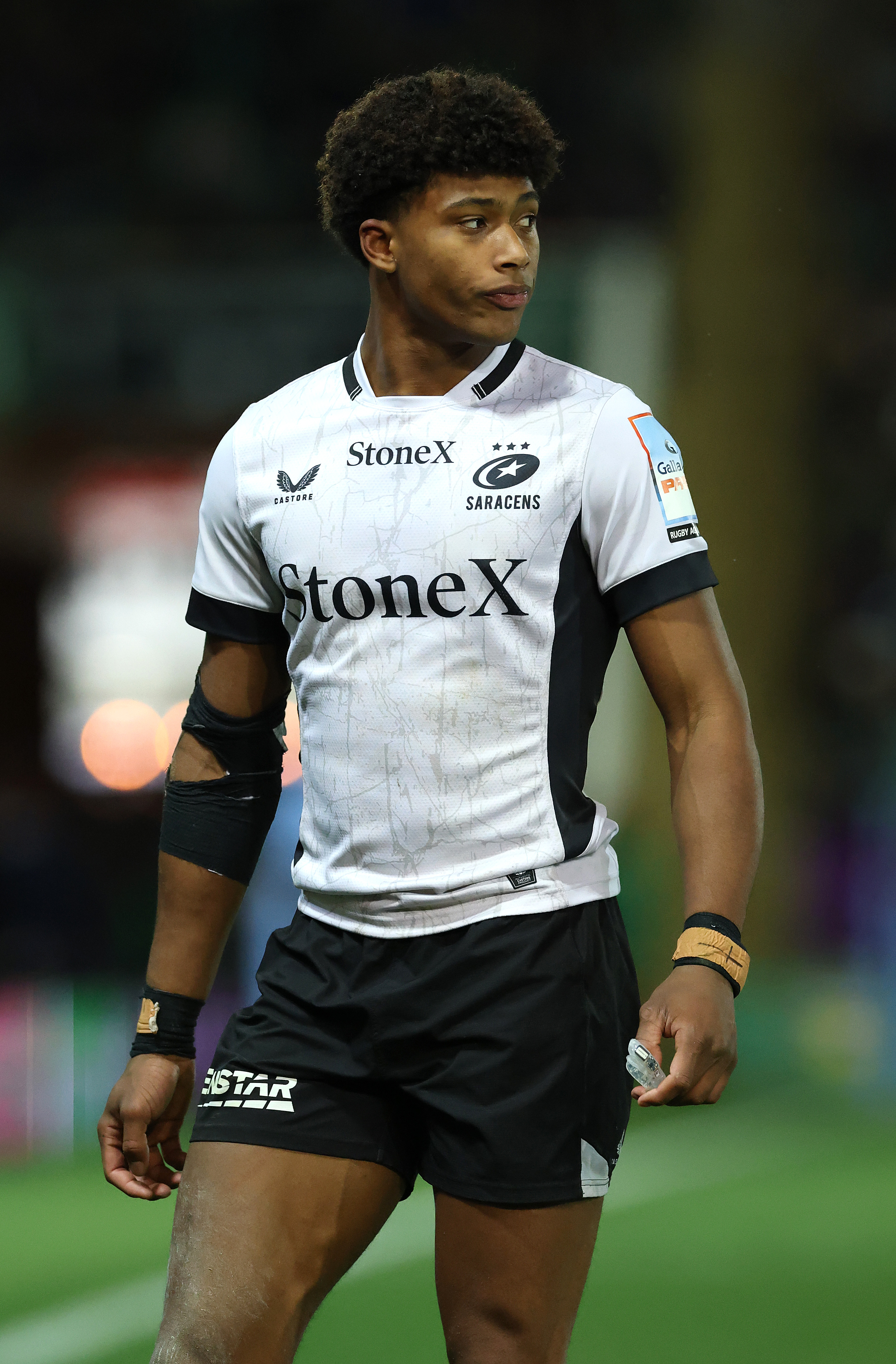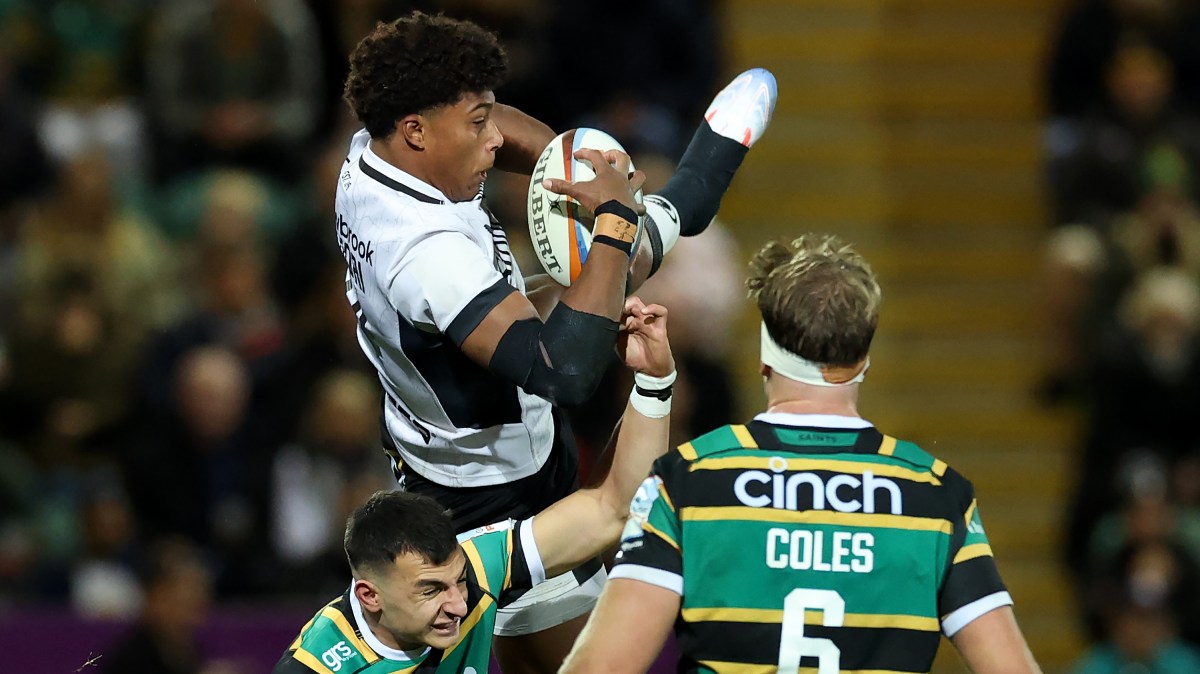Franklin’s Gardens proved to be the most difficult 64 minutes of Noah Caluori’s career to date. Still, that’s not too cataclysmic when you consider he had previously made only the one Gallagher Prem start in his life.
Before Friday night’s defeat by Northampton Saints, Mark McCall, the Saracens director of rugby, had suggested that everyone take a deep breath after the 19-year-old part-Swiss, part-Nigerian, all-English rugby sensation savaged Sale Sharks with a five-star, five-try performance. He beat Sale on his own. So said Alex Sanderson, the Sale director of rugby who is not a man overly given to hyperbole.
Steve Borthwick reacted by introducing him to the England squad. The teenager didn’t rejoin Saracens’ preparation for the match until Thursday, the day before. Hardly ideal, but what could McCall do — omit him after a five-try debut? After such a career take-off it would have been brutal to remove him from the starting XV.

After savaging Sale, the 19-year-old Caluori endured a tougher time of things at Franklin’s Gardens
DAVID ROGERS/GETTY IMAGES
He may have left the field at Northampton grounded but McCall was adamant that it was “a good experience, regardless”. The bad experiences often prove the best ones. Hopefully he will have learnt as much about rugby in Friday’s hour as he did in his combined time schooling at Hitchin Boys’ grammar, St Dunstan’s College and finally the Saracens-linked Mill Hill, where he studied on a scholarship.
Friday wasn’t chastening, it was grounding. It was a setback for those who dreamt of an England teenage debut at some stage in the next month. For the wing, it was a learning experience, nothing worse. Crucially he has a point of difference that is required more and more in elite-level rugby. Nobody leaps as high, nobody hangs in the air quite as long as he can. Utilised to maximum effect, he will terrify teams (injuries permitting and fingers crossed) well into the next decade and at the very highest level.
But that is then and this is now — and it was the other right wing on the field who claimed the headlines with a four-try burst to shatter Saracens. The reaction wasn’t as dramatic as the previous week’s Caluori story, but Tommy Freeman is a certainty for the England team, a three-Test Lion who scored in every Six Nations game this year. The only question surrounding the Saints right wing is where England will select him.
He started at No13 against Wales in the Six Nations finale, where he impressed me with the concentrated excellence of his defence as much as his potent running game. Watch the England v Australia match from a year ago again, see how the Wallabies tore apart England’s ragged midfield defence to shreds and it is pretty clear why Borthwick may be tempted to switch Freeman from No14. In attack he is a rugby wanderer. He can’t be categorised. His number is irrelevant. He can wear 14 and dart from behind a breakdown to power over with the defence not picking him out until too late. He can wear 13 and drift on to the wing where his aerial skills can be maximised.
Calouri has to learn this lesson of mobility. The future of rugby is flexibility. Players have to be effective anywhere on the field. While standing between touch and the five-metre line stretches opposing defences, it wastes a lot of an individual’s time. Wings are finishers but they have to be more than that — more than chasers and catchers too these days. Freeman is England’s everyman.

Freeman affords himself a moment’s impudence while scoring his third try against Saracens
DAVID ROGERS/GETTY IMAGES
Wings roam from areas where defenders find it more difficult to mark them. To line up at centre is to be within the opposition eyeline, like an old-fashioned battle formation. Christian Cullen, the great New Zealand full back from the dying years of the last century, was the finest runner I have ever seen but when he was switched to centre and asked to play a traditional game by the Kiwi coach John Hart, the opposing midfield shut him down from close quarters. Quantity of ball is one thing, quality quite another. At 13, 14 or even 15 — where I would like to see Freeman play for England — the requisite attacking word for the wide runners is “space”.
So much for Freeman. For Caluori, he has to learn so many of these lessons. If the quality of service from the kickers is not delivered he cannot stand wide and patiently, pointlessly, wait which was, alas, at times the case in Northampton. I am not sure if he drifted from off his right field to the left more than once. It may have been the same case against Sale but the Saracens kicks were spot on and his timing on another level. Five tries! Who cared where he was?
But on Friday the restarts and drop-outs were too long to utilise his point of difference, he couldn’t get there in time to challenge. The cross-kicks were of a lesser quality and his opposing jumpers were all arms and limbs. Not once did either Fergus Burke or Owen Farrell vary the cross-kick to bring him infield, cutting against the grain of the defence as Fin Smith did when Freeman slashed inside the drifting Theo McFarland for a try. It wasn’t just the 19-year-old at fault. He can’t catch the ball if its not there. In contrast, with Alex Mitchell and Smith playing it fast and varied, Freeman benefited from an excess of space.

Caluori often stood patiently, pointlessly wide waiting for cross-kicks that, when they did come, were lacking in quality
DAVID ROGERS/GETTY IMAGES
Freeman — we know — is a tremendously hard-working defender. It is a major asset in his capacity to play across the back line. Caluori struggled. Not many wouldn’t against the speed and skill of the Northampton backs. The Saracens right wing has never faced a team who strike like forked lightning. This was a first.
His tackling technique was rushed and ragged on a few occasions but when he defended space he held his position (as England had not against Australia) and shuffled dangerous two-on-one overlaps to the safety of the touchline. That was impressive.
The Sale dream did not turn into anything remotely nightmarish in Northampton but it did teach lots of critics, writers, ex-players and fans not to get too overexcited too soon. Maybe Caluori isn’t ready for the England squad and maybe he shouldn’t have been picked on Friday night, but who wants to wake someone from a wonderful dream? Lessons have been learnt and no harm done, except to the perpetual rugby dreamers.
As Shakespeare’s Caliban says: “When I waked/I cried that I might dream again.”
There’s nothing wrong with the occasional sporting dream, however brief.

